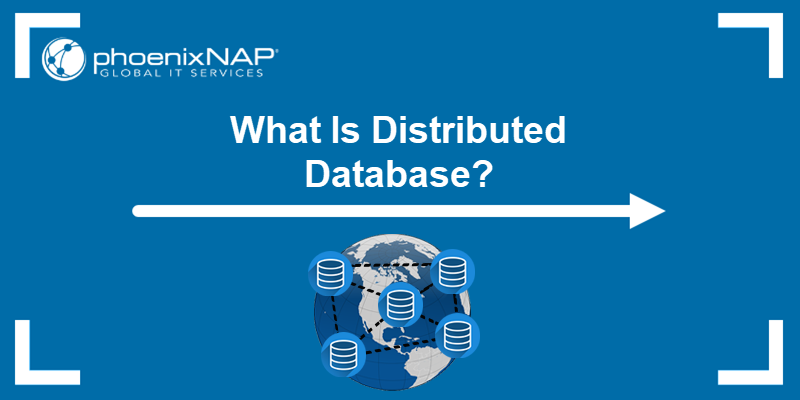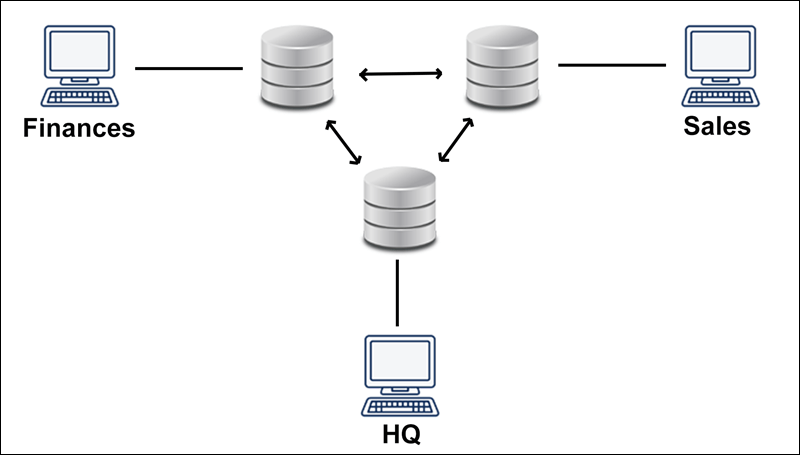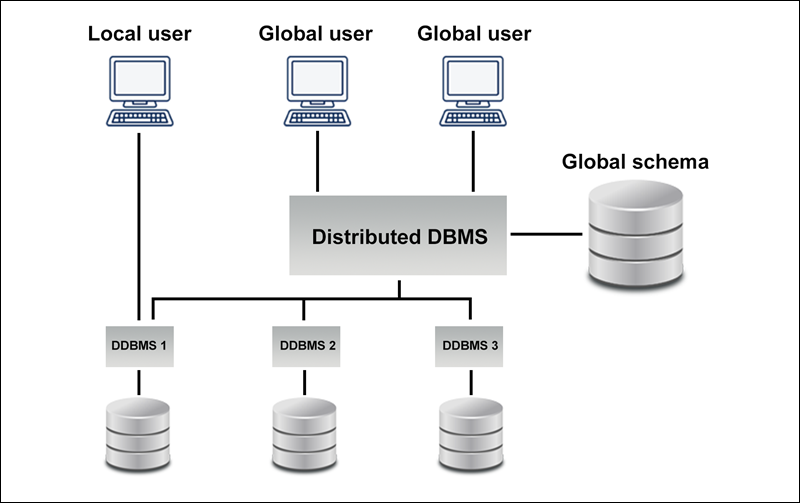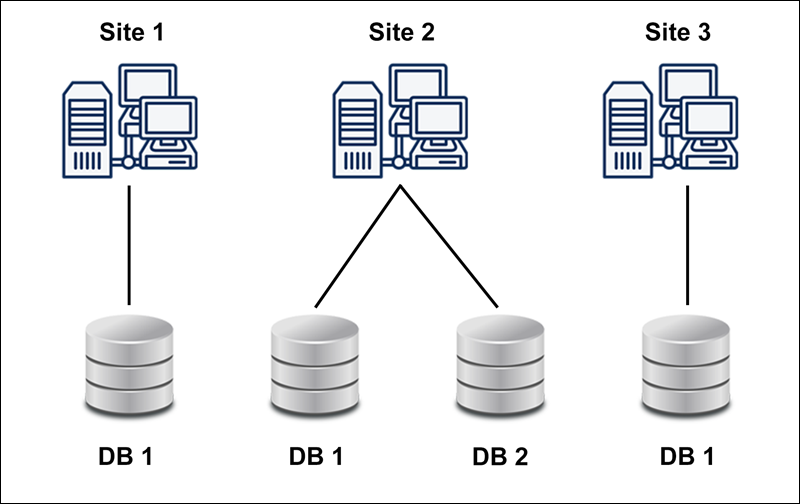Mẹo Which of the following are the advantages of using a distributed database management system (DDBMS)
Kinh Nghiệm về Which of the following are the advantages of using a distributed database management system (DDBMS) 2022
Hoàng Thế Quang đang tìm kiếm từ khóa Which of the following are the advantages of using a distributed database management system (DDBMS) được Update vào lúc : 2022-10-21 20:54:04 . Với phương châm chia sẻ Bí kíp về trong nội dung bài viết một cách Chi Tiết 2022. Nếu sau khi đọc Post vẫn ko hiểu thì hoàn toàn có thể lại phản hồi ở cuối bài để Mình lý giải và hướng dẫn lại nha.- Some of the advantages of DDBMS over centralized DBMS are:
- 1. Reflects organizational structure 2. Improved share ability and local autonomy3. Improved availability4. Improved reliability5. Improved performance6. Economics7. Modular growth
- Some of the
advantages of DDBMS over centralized DBMS are:1. Reflects organizational structure 2. Improved share ability
and local autonomy3. Improved availability4. Improved reliability5. Improved performance6. Economics7. Modular growthDistributed Database DefinitionDistributed Database TypesHomogeneousHeterogeneousDistributed Database StorageReplicationFragmentationDistributed Database Advantages and
DisadvantagesDisadvantagesWhat are the advantage of distributed database management system?Is one advantage of a distributed database management system Ddbms?What are some advantages of a distributed database?What are the advantages and disadvantages of Ddbms?
Some of the advantages of DDBMS over centralized DBMS are:
Reflects organizational structureImproved share ability and local autonomyImproved availabilityImproved reliabilityImproved performanceEconomics1. Reflects organizational structure
We can distribute the data base over any organization offices which has distributed locations
For example:
A bank has many branches in different areas. It is needed to be distributing database over these locations. A bank may keep a database each local branch office containing details such as the staff, the account information of customers etc.
The staff a branch office will make local inquiries of the database stored. The staff company headquarters will make global inquiries of the database stored all or a number of branches.
2. Improved share ability and local autonomy
Users can use the data on a site which is stored other sites. By this way the user can do local control of the data stored other site too.
A global DBA is responsible for the entire system. For local level DBMS, the local DBA is allotted the responsibility to manage it.
For example:
We can use google or facebook authentication to use truecaller application in our mobile phone.
Another example is, when we search something on net, like a dress or shoes etc. Than we get the same category of advertisements on any websites. How other website came to know what we were surfing. This is possible just because of DDBMS.
3. Improved availability
In DDBMS failure of system a node will not stop it. On failure DDBMS will get rerouted, means it will work through another node or path. And will available always from different routes. In DDBMS some sites may get inaccessible due to failure but this means not that entire system is not accessible.
But this advantage of DDBMS is not possible in centralized DBMS. In centralized DBMS on failure of a component enrite system will get stopped.
4. Improved reliability
The replication system make the data copy exist in many sites. So this insures the possibility of accessing to this data if there is any failure happened.
For example:
In a banking system, if data local branch gets destroyed than still it will be accessible from any location, from its another copy available headquarter.
5. Improved performance
The accessing speed of the data base can be improved, if we use remote centralized database. This removes the conflicts of using same database which were occurs in centralized DBMS.
For
example:
In a banking system, data stored headquarters is accessible to the many location or branches a same time.
6. Economics
For making the organization systems more cost-effective to obtain separate computers, DDBMS allows us to create systems of smaller computer, its collective power equal the power of one large computer.
For example:
Computer system in a banking system.
7. Modular growth
This refers to the flexibility of DDBMS, where we can add a new site without any effects on the operations of other sites.
Introduction
Distributed databases are used for horizontal scaling, and they are designed to meet the workload requirements without having to make changes in the database application or vertically scale a single machine.
Distributed databases resolve various issues, such as availability, fault tolerance, throughput, latency, scalability, and many other problems that can arise from using a single machine and a single database.
In this article, you'll learn what distributed databases are and their advantages and disadvantages.

Distributed Database Definition
A distributed database represents multiple interconnected databases spread out across several sites connected by a network. Since the databases are all connected, they appear as a single database to the users.
Distributed databases utilize multiple nodes. They scale horizontally and develop a distributed system. More nodes in the system provide more computing power, offer greater availability, and resolve the single point of failure issue.
Different parts of the distributed database are stored in several physical locations, and the processing requirements are distributed among processors on multiple database nodes.
A centralized distributed database management system (DDBMS) manages the distributed data as if it were stored in one physical location. DDBMS synchronizes all data operations among databases and ensures that the updates in one database automatically reflect on databases in other sites.
Some general features of distributed databases are:
- Location independency - Data is physically stored multiple sites and managed by an independent DDBMS.Distributed query processing - Distributed databases answer queries in a distributed environment that manages data multiple sites. High-level queries are transformed into a query execution plan for simpler management.Distributed
transaction management - Provides a consistent distributed database through commit protocols, distributed concurrency control techniques, and distributed recovery methods in case of many transactions and failures.Seamless integration - Databases in a collection usually represent a single logical database, and they are interconnected.Network linking - All databases in a collection are linked by a network and communicate with each
other.Transaction processing - Distributed databases incorporate transaction processing, which is a program including a collection of one or more database operations. Transaction processing is an atomic process that is either entirely executed or not all.
Distributed Database Types
There are two types of distributed databases:
- HomogenousHeterogenous
Homogeneous
A homogenous distributed database is a network of identical databases stored on multiple sites. The sites have the same operating system, DDBMS, and data structure, making them easily manageable.
Homogenous databases allow users to access data from each of the databases seamlessly.
The following diagram shows an example of a homogeneous database:

Heterogeneous
A heterogeneous distributed database uses different schemas, operating systems, DDBMS, and different data models.
In the case of a heterogeneous distributed database, a particular site can be completely unaware of other sites causing limited cooperation in processing user requests. The limitation is why translations are required to establish communication between sites.
The following diagram shows an example of a heterogeneous database:

Distributed Database Storage
Distributed database storage is managed in two ways:
- Replication
Fragmentation
Replication
In database replication, the systems store copies of data on different sites. If an entire database is available on multiple sites, it is a fully redundant database.
The advantage of database replication is that it increases data availability on different sites and allows for parallel query requests to be processed.
However, database replication means that data requires constant updates and synchronization with other sites to maintain an exact database copy. Any changes made on one site must be recorded on other sites, or else inconsistencies occur.
Constant updates cause a lot of server overhead and complicate concurrency control, as a lot of concurrent queries must be checked in all available sites.

Fragmentation
When it comes to fragmentation of distributed database storage, the relations are fragmented, which means they are split into smaller parts. Each of the fragments is stored on a different site, where it is required.
The prerequisite for fragmentation is to make sure that the fragments can later be reconstructed into the original relation without losing data.
The advantage of fragmentation is that there are no data copies, which prevents data inconsistency.
There are two types of fragmentation:
- Horizontal
fragmentation - The relation schema is fragmented into groups of rows, and each group (tuple) is assigned to one fragment.Vertical fragmentation - The relation schema is fragmented into smaller schemas, and each fragment contains a common candidate key to guarantee a lossless join.
Note: In some cases, a mix of fragmentation and replication is possible.
Distributed Database Advantages and Disadvantages
Below are some key advantages and disadvantages of distributed databases:
AdvantagesDisadvantagesModular development Costly software Reliability Large overhead Lower communication costs Data integrity Better response Improper data distributionThe advantages and disadvantages are explained in detail in the following sections.
Advantages
- Modular Development. Modular development of a distributed database implies that a system can be expanded to new locations or units by adding new servers and data to the existing setup and connecting them to the
distributed system without interruption. This type of expansion causes no interruptions in the functioning of distributed databases.
- Reliability. Distributed databases offer greater reliability in contrast to centralized databases. In case of a database failure in a centralized database, the system comes to a complete stop. In a distributed database, the system functions even when failures occur, only delivering reduced performance until the issue is resolved.
- Lower Communication Cost. Locally storing data reduces communication costs for data manipulation in distributed databases. Local data storage is not possible in centralized databases.
- Better Response. Efficient data distribution in a distributed database system provides a faster response when user requests are met locally. In centralized databases, user requests pass through the central machine, which processes all requests. The
result is an increase in response time, especially with a lot of queries.
Disadvantages
- Costly Software. Ensuring data transparency and coordination across multiple sites often requires using expensive software in a distributed database system.
- Large Overhead. Many operations on multiple sites requires numerous calculations and constant synchronization when database replication is used, causing a lot
of processing overhead.
- Data Integrity. A possible issue when using database replication is data integrity, which is compromised by updating data multiple sites.
- Improper Data Distribution. Responsiveness to user requests largely depends on proper data distribution. That means responsiveness can be reduced if data is not correctly distributed across multiple sites.
Note: Consider using a Multi-Model Database. Multi-model databases provide a singular engine for various database types.
Conclusion
You now know what distributed databases are and how they operate.
Distributed databases come with considerable benefits compared to centralized databases. After reading this article, you should be able to pick the right database type for you.
What are the advantage of distributed database management system?
Distributed Database Advantages and Disadvantages.Is one advantage of a distributed database management system Ddbms?
One of the advantages of a distributed database management system (DDBMS) is security. Distributed processing does not require a distributed database, and a distributed database does not require distributed processing.What are some advantages of a distributed database?
Distributed databases basically provide us the advantages of distributed computing to the database management domain. ... . Management of data with different level of transparency – ... . Increased Reliability and availability – ... . Easier Expansion – ... . Improved Performance –.What are the advantages and disadvantages of Ddbms?
Advantages and Disadvantages of DDBMS. Data are located near the greatest demand site. ... . Faster data access. ... . Faster data processing. ... . Growth facilitation. ... . Improved communications. ... . Reduced operating costs. ... . User-friendly interface. ... . Less danger of a single-point failure.. Tải thêm tài liệu liên quan đến nội dung bài viết Which of the following are the advantages of using a distributed database management system (DDBMS)
Post a Comment